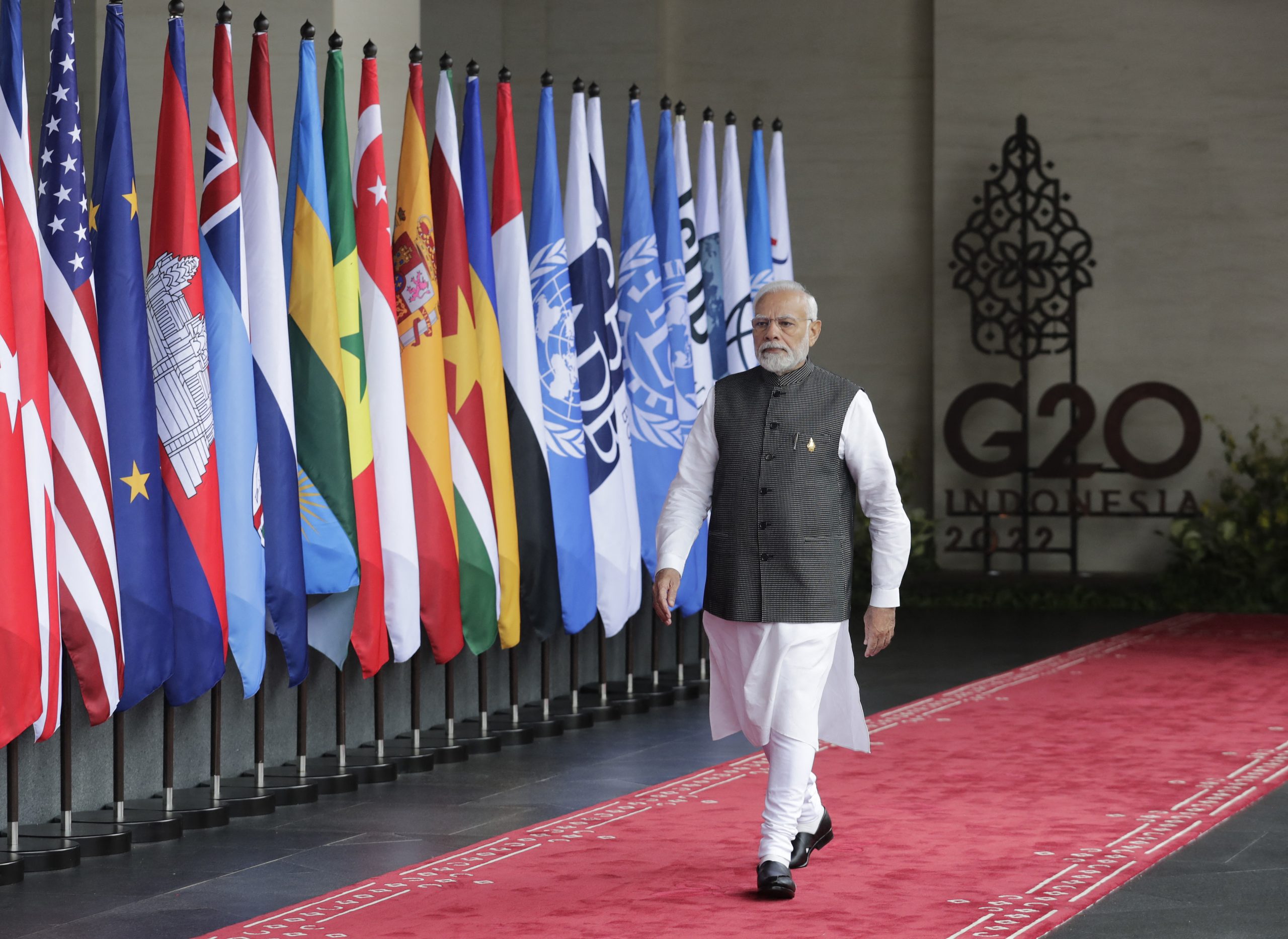
India assumes the G20 presidency, solidifying its rising presence and influence in global politics as a broker between east and west. Photo: Getty Images
by Sara Nazir 7 May 2023
India has a history of misleading the international community with its fake actions and propaganda. Similarly, India is holding the presidency of the G20 summit in Indian Illegally Occupied Jammu & Kashmir (IIOJ&K), Indian government has started its propaganda that India is facilitating Kashmiris by building roads and infrastructure and making Srinagar a smart city. But the reality is far different than the picture being portrayed by Indian authorities just to draw their soft image in front of the international community.doing so, India is exploiting the Kashmir valley for its political goals.
The G20 Tourism Working Group summit is a group of twenty states, will be held in Srinagar from May 22-24, 2023. Indian objective behind conducting such international activities in the disputed territory is to localize the issue and show that Kashmir an integral part of India.For the occasion, India has assembled a five-members coordination committee.Hosting the G20 conference in the disputed region would entail accepting India’s deceptive assertions that life is normal in the IIOJK, which would mislead the rest of the world about the reality there right now.
Kashmiri leaders claim that by hosting a summit in the disputed territory, India is attempting to obscure the truth about the Kashmiris’ struggle for independence. It is important to note that the Indian government has recently made an effort to project a sense of normalcy in the unstable area by hosting investment conferences for Gulf states and is now taking things a step further by attempting to host a G-20 meeting. India is responsible for serious atrocities and breaches of human rights in IIOJK. The continuous atrocities committed by India against the Kashmiri people have been noted in a number of UN reports, notably the Office of the High Commissioner for Human Rights (OHCHR) reports from 2018 and 2019.
The Indian government, by holding a meeting in Srinagar, is violating the United Nations Security Council’s (UNSC) resolutions which clearly depict Kashmir internationally disputed region between India and Pakistan. India’s efforts to change the demographic composition of the Jammu and Kashmir territory are blatantly against international law, the fourth Geneva Convention, and resolutions of the UN Security Council, especially resolution no. 38 (1948), resolution no. 47 (1948) and 112 (1957), which deals with the demographical and structural changes in IIOJ&K. Resolution no. 38 states that, “the Security Council should be immediately informed of any material change in the situation in J&K”. Similarly, resolution no. 48 deals with the question of the accession of Jammu and Kashmir to India and Pakistan should be decided “through the democratic method of a free and impartial plebiscite”. And resolution 112 stipulates that “any action that Constituent Assembly in IIOJ&K may have taken or might attempt to take to determine the future shape and affiliation of the entire State of J&K and any part thereof, would not constitute a disposition of the State in accordance of the above principle”.
Pakistan’s is holding the stance that India disregarded the region’s internationally acknowledged contested status. The Indian action has exacerbated tensions in IIOJK, and Pakistan has vehemently denounced the summit announcement in IIOJK as a flagrant breach of bilateral treaties among the two nuclear-armed neighbours as well as international law.
Ministry Foreign Affairs Pakistan in a press release on April 11, 2023 has stated that, “India’s irresponsible move is the latest in a series of self-serving measures to perpetuate its illegal occupation of Jammu and Kashmir in sheer disregard of the UN Security Council resolutions and in violation of the principles of the UN Charter and international law. Pakistan vehemently condemns these moves.Such events cannot hide the reality of Jammu and Kashmir being an internationally recognized dispute that has remained on the agenda of United Nations Security Council for over seven decades. Nor could such activities divert international community’s attention from India’s brutal suppression of the people of IIOJK including illegal attempts to change the demographic composition of the occupied territory”.
Not only Pakistan but the Chinese government also have claims over the areas of Kashmir. China and India also fought a war and many border skirmishes arises on the disputed territory. China has voiced its opposition to India’s ambitions to host the G-20 summit in IIOJK. Zhao Lijian, a spokesman for the Chinese Foreign Ministry, said during a media conference in Beijing that China’s stance on the Kashmir problem is constant and unambiguous. The UN Charter and Security Council decisions should be used to peacefully and appropriately resolve the Kashmir issue, a conflict from the past. To preserve regional peace and stability, the parties involved must refrain from taking any unilateral actions that might worsen the situation. Instead, they should make an attempt to resolve the disagreement via communication and consultation.
International community must consider Kashmir as a disputed territory and take notice of the Indian violation in the IIOJ&K instead of participating in the G20 summit in Srinagar. The only objective for holding the presidency of G20 summit in India is to become the regional power. India is taking the advantage of geopolitical location and heavenly beauty of Kashmir valley just to fulfill their hegemonic objectives. KashmirIndia should be held accountable for their violent actions and atrocities towards the people of Kashmir. International community and Human rights watchdogs should visit the site and observe the suppression, violence and discriminationfaced by the Kashmiri people.
